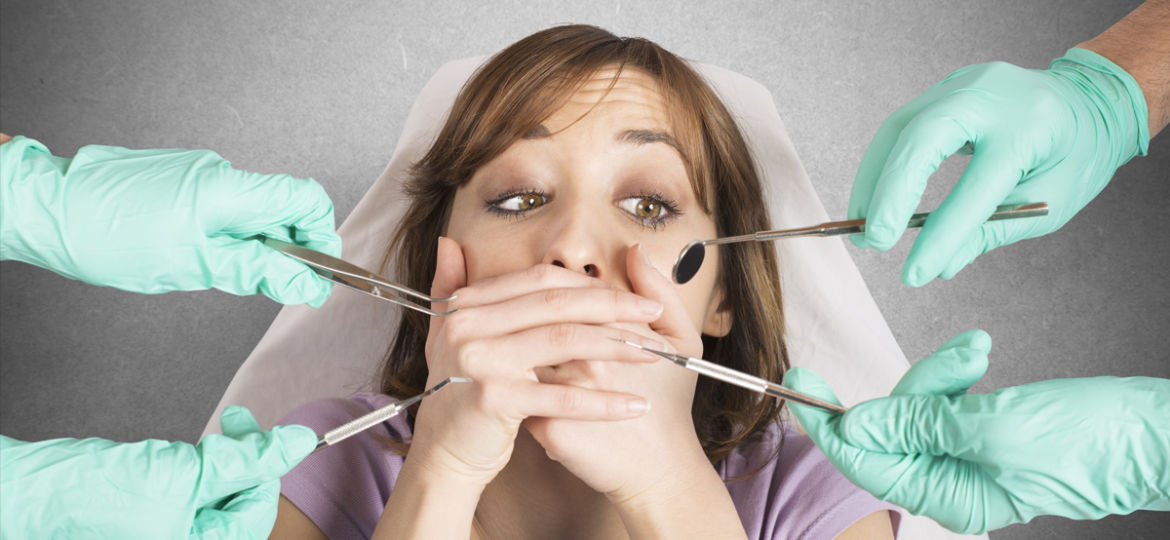
Most people find a visit to the dentist at least a little daunting, but for some this normal feeling of nervousness is elevated to a whole new level and becomes a genuine and debilitating fear. Not only does this make dental visits unpleasant and stressful, it can lead to examinations being avoided altogether, resulting in a vicious circle: a reluctance to visit the dentist means minor problems go undetected and escalate, meaning that more extensive treatment is eventually needed which only increases distress levels.
Fortunately, dental phobia is a well understood problem, and can be treated effectively by a process of acclimatization to dental visits. By using relaxation techniques and strategies to make each trip to the dental surgery a little less intimidating, the fear can be reduced to entirely manageable levels over time. Here are six ways to get started on overcoming a dental phobia.
1) Tell the Dentist About the Problem
Every dentist will have come across their fair share of nervous patients, and will be happy to do all they can to make your experience less stressful. A good dentist will be entirely sympathetic and take your misgivings seriously. If you find that your worries are dismissed too easily, then it may be time to look elsewhere.
2) Arrange a Stop Signal
It’s a good idea to arrange an emergency signal in advance that you can use to halt treatment when nervousness starts to turn to panic. A simple raising of the arm from the armrest can be enough to let the dentist know that you need a break to calm yourself and gather your wits. Not only will this provide a safety valve for when things start to become overwhelming, but it will give you a greater sense of control, which can in itself be enough to reduce anxious feelings.
3) Take a Friend
Many people feel happier and more relaxed simply by having a trusted friend sit by them during the examination. A companion can provide moral support and distract you with conversation, while they will also be sensitive to your mood and can help the dentist recognize when a short break might be helpful.
4) Use Music as a Distraction
Having music playing during treatment can be both relaxing and serve as a distraction from what’s happening. Many dentists will be happy to have your music of choice playing over loudspeakers in the surgery, but for many nervous patients a better solution is to wear headphones. Not only does this allow greater volume and more distraction, but it can also cover up some of the disconcerting sounds made by the dental equipment. Just be sure to arrange a signal that the dentist can make when your attention is needed, such as a tap on the wrist.
5) Mental and Physical Distraction
If your level of apprehension isn’t too high, you might be able to conduct a form of mild self hypnosis by letting your mind wander off into daydreams, or alternatively distract yourself by trying to solve a mental problem, compile a shopping list, count imaginary sheep, whatever – anything that will stop you focusing too much on what’s happening inside your mouth. It can also be very helpful to employ physical distractions, such as the tried and tested relaxation technique of tensing and relaxing each muscle of your body in turn, or concentrating on wriggling each of your toes in order.
6) Sedation
Sometimes, especially on a first visit after a long break away from the dentist, or when extensive treatment is required, a little help from the drugs cabinet is the best option. Although a full anesthetic is rare for dental work nowadays, various levels of sedation are available, from gas and air to an injection.
Few people will ever actively enjoy a visit to the dentist, but there’s no reason for this natural apprehension to spiral out of control and lead to treatment being avoided entirely. By taking things slowly and using the ideas above a dental phobia can be reined in, and you can enjoy good oral health without fear.

